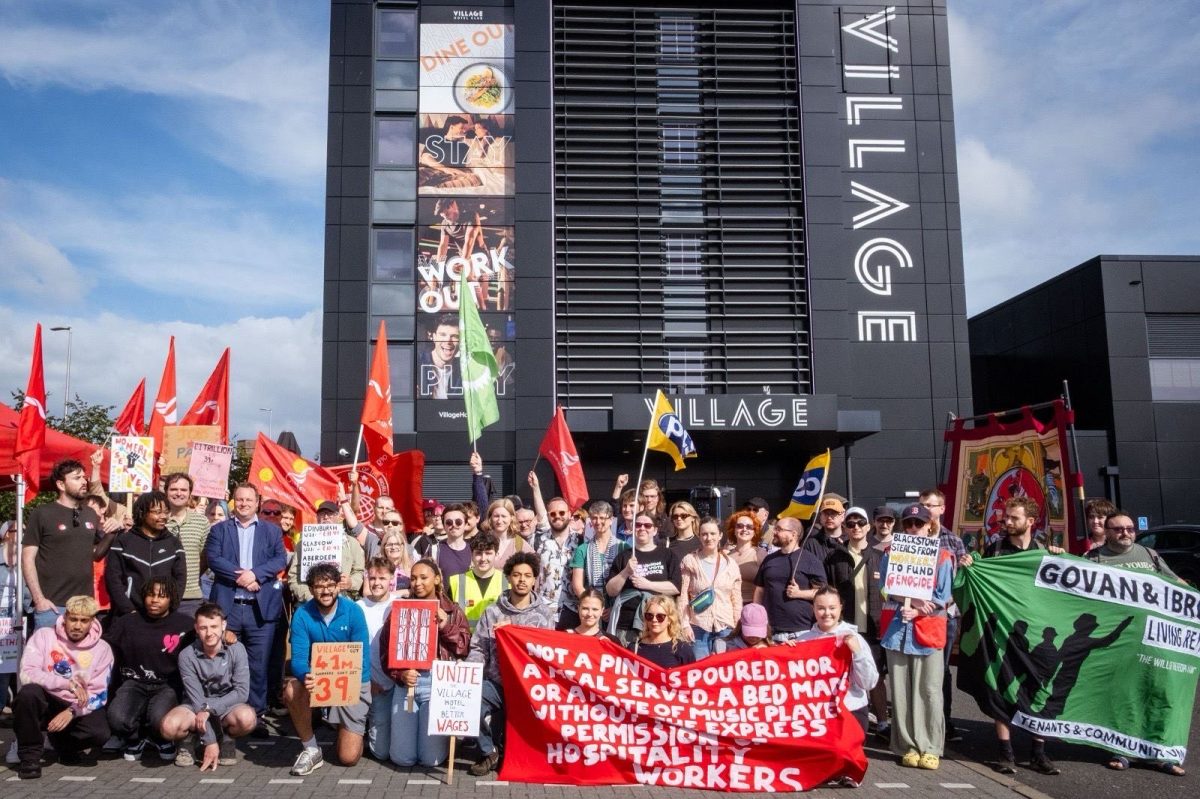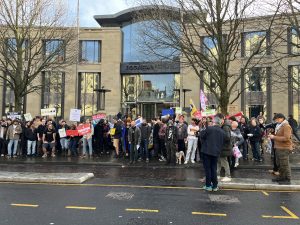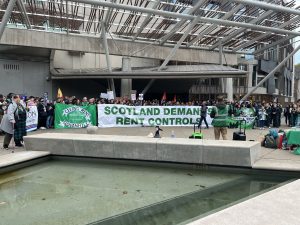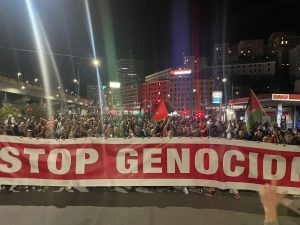
Village Hotel workers on strike
Tony Boardman •Strikes in the hotel industry are rare. Tony Boardman spoke to workers on the Glasgow Village Hotel picket line.
Workers at the Village Hotel in Glasgow are on strike, in the first major hotel strike since 1979. They are striking over three main issues: most workers are paid less than the real living wage of £12.60; workers under 21 are paid significantly less; and workers’ breaks are unpaid. In addition, workers under 21 are angered by earning £1 an hour less in Glasgow (£10.42) than their counterparts at Village Hotels in Edinburgh (£11.44). This lower pay patronisingly assumes that young workers have no financial responsibilities – yet these workers pay rent, face rising food costs, and some are supporting families.
Unite members voted 100 per cent in favour of strike action, on an 81 per cent turnout. After the Glasgow Village Hotel workers walked out, Radisson Blu hotel workers, organised with United Voices of the World, also voted to strike. For there to be not one, but two hotel strikes after 46 years without one is an encouraging sign for the labour movement in the hospitality sector.
Management has responded harshly. In the first week of what is planned to be a month-long strike, they have called the police twice on picketing workers. They have also bussed in scab labour from Liverpool, showing workers they would rather pay for scabs than meet their pay demands. Meanwhile, members are hoping they can get their demands met in formal talks with ACAS. One worker, who described not receiving paternity pay in the following interview, has now received this payment after management were pressured to give him it.
On Sunday 3 August, at the first public demonstration in support of the strike, I spoke with four young striking workers. They described the reasons they had walked out: the injustice of pay differentials, lack of training, understaffing, and the dangers of working alone. They also spoke about their hopes for the future, the inspiration they have drawn from solidarity across the labour movement, and the bonds they have built across the hotel complex, which includes the hotel itself, a Starbucks coffee shop, a gym, and the Pub & Grill restaurant.
Listen to the interview here:
They need support!
- If you are in Glasgow, stop by the picket line every day in August, and follow Unite Hospitality Glasgow for information on their next megapicket on 22nd August.
- Please donate to their strike fund! Get your union branch to donate money to the Village Hotel strikers.
- Send the striking workers a solidarity statement, or pictures of you and your friends, coworkers, comrades, holding messages of solidarity.
Transcript
Tony and Kristofer
Can you tell me a bit about why you’re on strike today?
Tony: I’m on strike for equal pay. We work the same, we do the same things and work the same amount of hours every day, and we get paid less because of our age. And I feel like that’s unfair.
When do you get a higher rate of pay?
Tony: Once you’re over the age of 21, that’s when your amount increases. But I don’t know, we’re still doing the same thing.
What does it mean for you in your personal life, to go on strike? Have you been on strike before? Have people in your family?
Tony: My mum and dad have been on strike, and just seeing them do the strike to get what they want, I feel like that inspired me a bit, because I’m going to uni next year, and I don’t think £10 [an hour] is going to help me get far in life, you know.
So a hotel worker in Edinburgh asked some questions, based on his own organising efforts. He asks how you organise and coordinate across a multi branch company where most workers don’t know each other?
Kristofer: Unite the Union. We have Daniel [Unite hospitality organiser] who goes around and gets people in, the membership. After that, we have meetings together to discuss how we’re going to take action.
How would you speak to workers who don’t have any interest in the union, if they’re depoliticised or too scared?
Tony: I think you just have to go for it. You just have to go for it, be confident, because at the end of the day, there’s someone also in that position, and they’re also scared, so you just have to be a voice of reason for them.
[Kristofer], could you say a bit about what you were saying before [in the rally], about not getting paternity pay?
Kristofer: The start of April, I had my child. I got to the end of April, I got my paycheck. I should have had at least one week of paternity in that paycheck, so I brought it up to the manager. He said he’ll sort it out. Got to the next paycheck in May – I hadn’t had any of it still. He got me in to fill forms. Said it would be sorted within a couple days. Then about a week later, the start of June – this is two months after I’ve had my child – he gave me a phone call and told me I’m not eligible and that I couldn’t get it, even though they offer enhanced paternity apparently, on the job descriptions. There’s nothing ‘enhanced’ about it.
What’s the solidarity been like among the staff who are out on strike today?
Kristofer: We’re all here for the same and different reasons, I think. We’re all here to get what we want.
One last thing what’s the best way to show solidarity with you for people outside?
Tony: I think it’s just, come and support, raise your voice that’s all.
And give to your strike fund!
Yeah!
Amy and Shakeira
Can you tell me a bit about why you’re on strike today?
Amy: I work in the Starbucks sector of the hotel. I’m on strike because we’ve been told recently that we need to work the last two working hours by ourselves in the store alone, which in general is dangerous because you have a till full of money – there’s anything that can happen, and you’re by yourself, there’s nothing you can do. Yes, there’s precautions put in within the hotel, but I’ve only ever seen one of the little recorder things – I’ve only ever been shown how to use one once. I don’t know how they work, without training.
And so I don’t feel safe, just being there by myself. And also, it’s a lot more work than for just one person. It’s a lot more work than even just two people, but that’s what we used to have. You feel like you’re getting wrung out like a sponge. And it’s draining because on top of it, I’m also a student, and I don’t know if I’ll be able to keep on top of the stress for that, and also my studies.
I’m here for, hopefully, a better future.
How does it work, is the Starbucks sector owned by Village Hotels?
The Village technically owns it. We don’t see the same benefits as, like, a like, a standalone Starbucks store. [Though] we won’t be asked to, like, go and work in Edinburgh for cover or anything like that. That aspect is okay.
Shakeira: I feel like they rely on us too much.
And where do you work?
Shakeira: I work in the Pub & Grill, so food and beverage. So I feel like they rely on us too much and we’ve got other commitments, but I feel like we’re always here. And they make us work long hours, and we don’t get paid breaks. But I feel like sometimes, after it’s been so busy, like, I don’t get a break, but the money does, like, come out of my wedge, so it’s just not fair on any of us.
The job is a lot, it’s a lot to do. And when it’s busy because of [events on at] the Hydro [arena, just over the river from the hotel], everyone’s stressed out. It’s a mess, and we have to stay later to clean that. And it’s just put on us.
Amy: On the back of the Hydro thing, they’re claiming that Edinburgh employees need higher pay because of a higher cost of living in the city. But we consistently have events, month after month out of the Hydro – it’s a five minute walk across water. And it fills up in the football games as well, because we’re so close to Ibrox [stadium]. We’ve had many times where there’s parades or floats and stuff, and people come in after that. And it’s really unpredictable in that sense, where you don’t know if you’re gonna be slightly busy or run off your feet.
I feel like we should be at least given the grace of having a paid half hour break. Because not only is it a physically draining job, it’s mentally tasking. because you need to list all out in your head and go: main priority, bang, bang, bang. But yet, they won’t look at that and see all the steps that led you to the end of your shift.
It’s really disheartening, and especially when upper management are coming around to me, looking me dead in the eyes, and going, “Oh, can I get six large drinks made” whilst I’ve got eight people queued out of my door, and I go, “for free?! Are you not paying for that?”, and they never do. It’s just kicking a man while they’re down. You’re already exhausted off whatever’s happened during your own personal life, and then it’s working 10 plus hours, more than that, a day.
What’s it been like organising across the different parts of the Village complex, when you’re already exhausted from work? How did you end up meeting each other and starting organising together?
Amy: It would seem like we met through the staff room, but no one uses that staff room. So you’ve got the leisure team, housekeeping, everybody’s in there, but no one actually goes in there, because the chairs aren’t comfy. There’s a microwave that doesn’t work, the vending machine doesn’t work. There was, when I first started last September, a packet of Maltesers that was so sun bleached, it was basically white. That’s how long it was in there.
Normally, the way that I would work it with Pub & Grill, Starbucks would have quite a lot of food wastage left over for the rest of the night. And so I would just come around and be like, “Hey girlies, do you want a wee treat?” Because I know that they’re not getting fed for like, just working. So I’m like, Okay, I’ve got this there, so I’m very much like, youse can have it.
Shakeira: Yeah, everyone sees each other in the corridors, so you just say hi. But I feel like there’s such a divide. Pub & Grill will just talk to Pub & Grill, we don’t really cross paths. But I also feel like managers, they’re never there. They’re walking around the hotel, like, really, just doing nothing. It’s just unfair for us.
Can you just say what it’s been like for you personally? Have you been on strike before?
Amy: I used to work in the Taco Bell on Argyle street. They took industrial action at the start of the year, in February. They trained new Argyle street employees in the Sauchiehall Street store so they wouldn’t be “indoctrinated by the union”, which I found so telling, because, of course, you know that there’s issues when you’re literally not letting them get trained in that store, just so they can leave in four months or something like that. I just found that really pathetic on upper management’s end, but it was really empowering when [Unite Hospitality organiser] Daniel came with me and was like, they’re still up for it. They’re still fighting. And that kind of gave me the courage to also come, you know, stand up for my own issues and rights.
Shakeira: And this is my first experience of a strike. I’ve never seen anything like this before. I was a bit nervous coming today, because I thought it’d literally be the workers. I didn’t expect this many people. And [Unite Hospitality organiser] Bryan asked me to talk, and I was like, I’m not sure, but I just done it anyways. And it was, I don’t know, really empowering, to be fair. Like, it’s just really inspiring all these people here, and at the first big hotel strike in [46] years. It’s just really inspiring.
And finally, what’s the best way for people outside to show solidarity with you?
Honestly, just come along. You know, if you have a few spare, few spare hours, or like, even just half an hour, you know, come along, show sport, clap your hands, make some noise.
When are you gonna be here? We’re here for the majority of August. So we’re gonna put in a shift!







0 comments